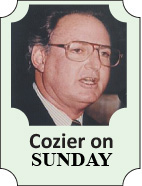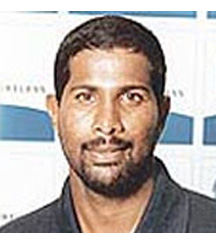The prolonged fight for control of West Indies cricket has just got more intense.
Until now the hostilities between the combatants, the West Indies Cricket Board (WICB) and the West Indies Players Association (WIPA), as disruptive as they have been, were confined mainly to meaningless skirmishes with the occasional outbreak of something more serious.
Under the aggressive, uncompromising generalship of its long-serving, self-appointed leader, Dinanath Ramnarine, the WIPA has prevailed in almost all its battles over its wavering adversary which he once described as “tyrannical and despotic”.

So it has won most of its battles but it has not won the war.
Two weeks ago, while the two in the middle of negotiations over a new Collective Bargaining Agreement (CBA)/Memordaum of Understanding (MoM), the WIPA dropped the bombshell it clearly believes would change that and lead to a new direction for West Indies cricket in which it would have a prominent role.

It came in the form of a lawsuit against the WICB, lodged in the Trinidad and Tobago High Court. Its seeks U$20 million in damages for itself and its members for restraint of trade over the board’s refusal to grant the uncontracted, former captain Chris Gayle an unconditional No Objection Certificate (NOC) that would free him to join whichever team he chooses.
Its language was typically belligerent, charging that the WICB “engaged in a malicious, wanton and wilful campaign to breach the express and implied terms of the Collective Bargaining Agreements (CBA) …as well as imposed unlawful and unreasonable restraints of trade on West Indies cricketers.”

Should the court grant the WIPA its petition, the WICB would be hard-pressed to cough up the money. More to the point, it would surely lead to sweeping resignations, possibly even to its demise.
Whether Ramnarine, WIPA president and chief executive for eight years, would see it the same way should the judgement go against his organisation is debatable.
The ramifications of a WICB defeat for world cricket are clear since all other International Cricket Council (ICC) members are governed by the same guidelines on NOCs as the WICB.
They determine whether they should be issued to any of their players, not under central contracts, who seek release to join the Twenty20 tournaments mushrooming everywhere (as they have usually done). The one stipulation is that they must return to their national teams if and when required.
That would clearly not apply to the unconditional NOC that Gayle, already engaged in awkward negotiations over reasons for his continuing omission from the West Indies team, is seeking. In contrast, he, and others like him, would be free to come and go, without restraint.
That is the crux of the law suit.
The WICB’s only comments on the issue to date have been that “its legal team is studying the documents and a further statement will be made at the appropriate time”, that it “regrets that WIPA has taken this action in the middle of the MOU/CBA negotiations” and that it has “never refused to grant any player an NOC”.
As the two sides prepare their briefs, the lawyers would already have pored over details of cricket’s most famous restraint of trade case.
It was brought before the London High Court in 1977 by three players (Tony Greig, John Snow and Mike Proctor) contracted to Kerry Packer’s private, revolutionary World Series Cricket against the ICC and England ’s Test and County Cricket Board (TCCB) for debarring them from all cricket under their auspices. While there are essential differences between the two cases, restraint of trade is central to both.
The issues were so complex that the hearing lasted 31 days and Mr. Justice Slade took five and a half hours to deliver his judgement that covered 221 foolscap pages.
He came down in favour of the Packer players, ruling that on them the bans were “ultra vires and void as being in unreasonable restraint of trade”. He awarded costs to the plaintiffs, estimated at 200,000 pounds at the time.
A similar marathon – if not necessarily similar outcome – can be expected in this case. The result can well resolve the future direction of West Indies, indeed world, cricket.




